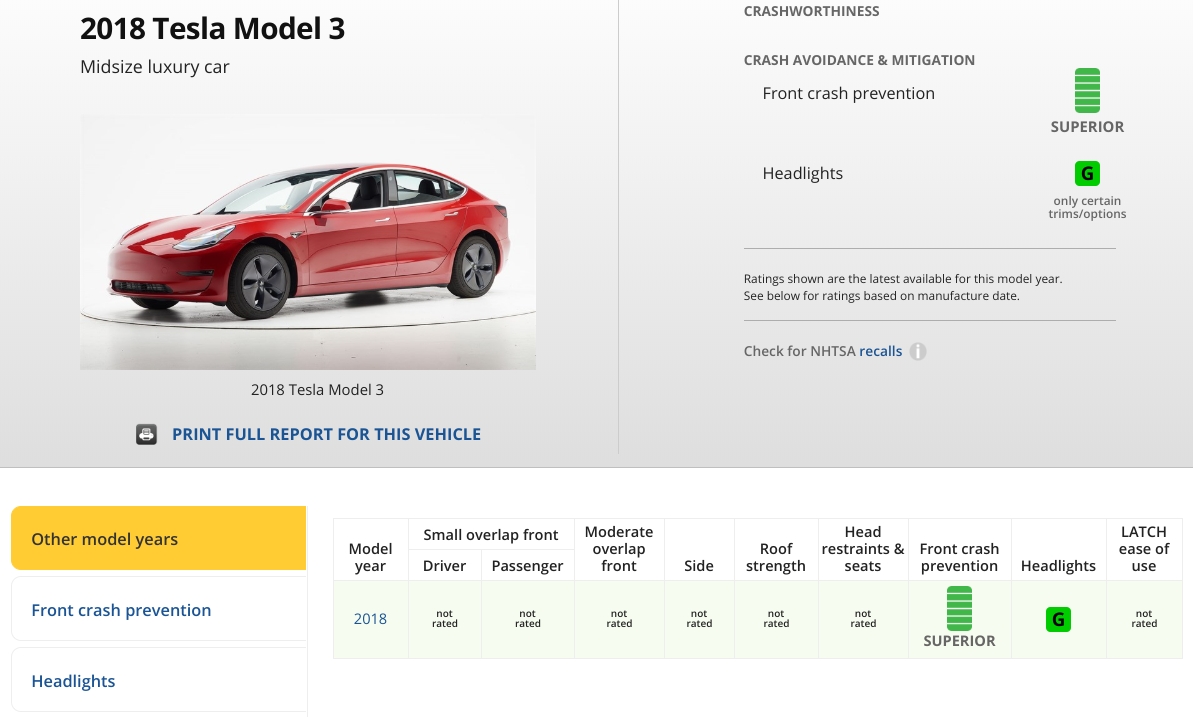Earlier this year, the Insurance Institute for Highway Safety (IIHS), a nonprofit organization dedicated to reducing the number of accidents and injuries on the road, awarded the Tesla Model 3’s headlights with an “Acceptable” rating. While the IIHS’ tests gave a “Superior” rating for the vehicle’s front crash avoidance features then, the safety organization only listed the vehicle’s headlights as “Acceptable,” due to glaring issues from the Model 3’s low beams.
In a recent Twitter announcement, though, the IIHS noted that the Tesla Model 3 now earns a “Good” rating for its standard LED reflector headlights. The IIHS stated that the vehicle’s improved, updated score reflects the headlights of Model 3 that were produced after June 2018, a time when Tesla was starting to hit its stride with the production of the electric sedan.
The IIHS’ updated results could be seen in the Model 3’s page on the nonprofit’s website. So far, though, the IIHS has not released the Model 3’s official full safety ratings, which include metrics such as “Roof Strength” and “LATCH ease of use.”

That said, the Model 3’s “Good” rating for its headlights says a lot about Tesla’s focus on designing an incredibly safe electric car. The IIHS, after all, utilizes one of the strictest metrics for testing headlights. The headlights of the Tesla Model S, for one, were given a “Poor” rating by the IIHS. The Chevy Bolt EV’s headlights, which are incredibly bright, were also rated as “Poor.”
The IIHS evaluates headlights based on the lamps’ reach as the vehicle travels on straight and curved lines. Low beams are measured on five approaches — straightaways, left and right curves on an 800-foot radius, and sharp left and right curves on a 500-foot radius. The IIHS weighs low beams more heavily than high beams since they are used more often when driving. During the Model 3’s initial tests earlier this year, the vehicle’s low beams exhibited a 15.2% glare during straightways, preventing the Model 3 from earning the IIHS’ “Good” rating. As noted by the IIHS, this particular issue was addressed in Model 3 produced after Q2 2018.
The updated score of the Model 3’s headlights highlights Tesla’s unique tendency to update its vehicles as soon as improvements are available. This was pointed out by Elon Musk on Twitter, when he stated that when it comes to Tesla’s electric cars, there is “no such thing as a full refresh” since all vehicles are “partially upgraded every month as soon as a new subsystem is ready for production.” This practice was also mentioned by Tesla President of Automotive Jerome Guillen in an interview with CNBC, when he noted that the company’s technology is always in a process of evolution.
The 2018 Tesla Model 3 now earns a good rating for its standard LED reflector headlights for models built after June 2018. Previous models earn an acceptable rating. https://t.co/EUWXFLBnkm pic.twitter.com/TOctSTGaAl
— IIHS (@IIHS_autosafety) December 26, 2018
In a statement to CNET, IIHS senior vice president for communications Russ Rader explained the organization’s focus on headlights as a metric for vehicle safety. Rader also noted that headlights must be seen not just as a decorative component of a vehicle. Instead, they should be perceived as safety equipment.
“When one vehicle’s low beams only illuminate the right side of a straightaway for 148 feet, and another vehicle’s low beams allow a driver to see more than twice as far, there’s a problem. IIHS has incorporated headlight performance into our Top Safety Pick awards. We’re already seeing manufacturers make improvements, especially tightening up aim at the factory. Headlights shouldn’t just be about what looks cool. They’re important safety equipment. When they perform well, they can help drivers spot trouble sooner and avoid a crash.”
Apart from the IIHS, the Model 3 is also gaining accolades from other safety organizations. The National Highway Traffic Safety Administration (NHTSA), for one, has given the Model 3 a flawless 5-Star Safety Rating. The organization tested the Model 3 on frontal crash, side crash, and rollover safety; and in all categories and subcategories, the electric car displayed a level of industry-leading driver and passenger safety. As highlighted by Tesla in a following blog post, the scores of the Model 3 from the NHTSA’s tests place the electric car as the vehicle with the “lowest probability of injury” among all cars tested by the NHTSA to date.

